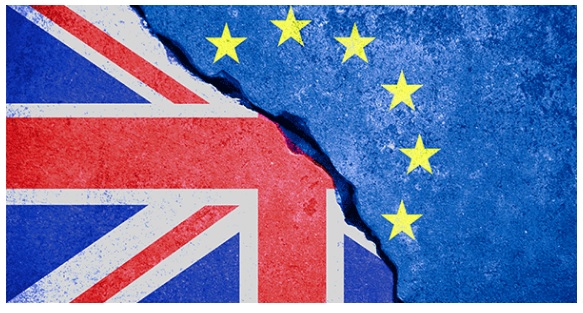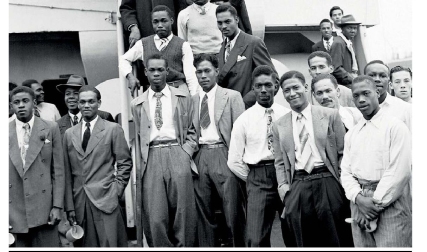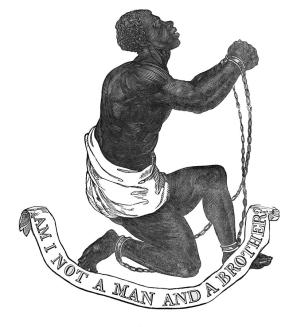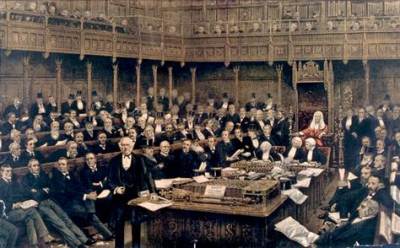Tagged: Current Affairs
Brixton: A Tale of Two Towns
I grew up near Brixton and from as far back as I can remember it has always been a place of special significance. As a British person of Afro-Caribbean descent, Brixton plays an important role in my cultural narrative. It was Brixton where the first wave of Caribbean immigrants arriving in England in the late 40s laid their roots and built their lives; they brought with them their music, style and culinary traditions which transformed the town, infusing it with a distinctly West-indian feel and flavour. It was also Brixton where, in a culmination of outrage and indignation at anti- black policing and institutional discrimination in the 80s people rioted, and streets and stores were set furiously ablaze. Over the years, whilst the ethnic struggle continued, Brixton nevertheless came to be emblematic of a communal unity that transcended race. Even in the midst of chronic underfunding from both the public and private sectors resulting in pockets of poverty and high crime, Brixton represented a certain togetherness, where blacks and whites united, not by ignoring their cultural and racial distinctions, but by treating these differences as important constituents of a wider communal whole.

These somewhat halcyon days of cultural and racial unity now appear to be a thing of the past in Brixton. Like many areas in London, recent years have seen the town subjected to the invidious forces of gentrification. House prices have sky rocketed and the moneyed (predominantly white) middle-classes, looking for accommodation within reasonable distance to the city, have poured in. It isn’t that an alteration of demographics is itself a problem; London is a city that has historically undergone constant change as different peoples have mixed and mingled together throughout the ages. However, it is the tendency of gentrification to eschew cohabitation and to instead displace communities and cultures that is problematic. The rising rents in Brixton have pushed many local ethnic businesses out of the area and have forced many people, particularly poorer residents of colour, within the local community into cheaper accommodation elsewhere. The result? Brixton is becoming visibly less diverse and the racial and cultural unity that was once the hallmark of the town is fast evaporating.
On a recent visit to a pop-up restaurant and bar complex in the heart of Brixton, I was taken aback by the lack of diversity in what was once one of the most cosmopolitan parts of the town. Besides myself and a friend, the only minorities present were either serving or securing the people on the premises and the diversity of food on offer did little to disguise the conspicuous lack of diversity within the venue itself. Other observers have commented on this changing face of Brixton and remarked on what can only be described as an insidious sort of “ethnic cleansing” taking part as a result of its gentrification.

Some have argued in response to these concerns that gentrification has brought investment which has in turn improved Brixton. This argument is usually embodied by the expression that “a rising tide lifts all boats”. Whilst it is no doubt true that investment improves an area, if the original residents have been forced out of the housing and business markets, then the question is who does this investment improve the area for? As a corollary to this question, we also have to ask ourselves why does investment have to wait for new residents? Couldn’t investment in Brixton to clean up the streets and open up new commercial spaces have pre-dated the demographic shift which in turn could have created jobs and opportunities for those who needed them most? These questions cast doubt over the apparent benefits of the town’s gentrification.
The story of Brixton is indeed a tale of two towns. Unfortunately, whilst the new Brixton certainly has a veneer which is more polished than the old, these improvements have come at the expense of diversity and a slow and gradual eradication of the cultural and communal unity upon which Brixton built its name.
Brexit: A Thought–Piece
In my decision to write this piece I have chosen, much like the United Kingdom in its decision to leave the European Union, to break somewhat with established convention. In contrast to the deluge of carefully structured articles that have surfaced in the aftermath of Brexit, this post will instead be a ‘thought-piece’; a stream of consciousness whose design reflects not only my mental chaos as I try to grapple with this occasion, but also the economic, political and social chaos that has gripped the country in the wake of it. In truth, it is difficult to know where to start with Brexit, some of the reasons underpinning it are as old as the UK itself, deeply rooted in a history of empire as well as in class politics. On the other hand, some of its conduits were decidedly modern and were anchored in the waters of globalisation, rapid social change and a climax of Euroscepticism carefully whipped up by far-right parties in the run-up to the vote. Whilst volumes could be written about any one of these topics, in this piece I will pick out a few of the key themes that were at the heart of the referendum and offer some of my thoughts on our European exit.

Democracy
“Democracy” was the buzzword of the leave campaign, a slogan repeatedly chanted like some Vedic hymn both in the run-up to and after the EU referendum. “The EU is undemocratic” they cried, “we need our democracy back” they howled. As an initial thought, it’s strange that a negative definition is as close as we ever seem to get to the concept of democracy. In other words, whilst we seem to have a pretty good idea of what democracy is not, we have virtually no idea of what it is? We know, for example, that it is not rule by military might, nor divine right (although many believe that our monarchy contradicts this principle) but who can truly say that they know what democracy is? Philosophers and political theorists have long posited that democracy is best defined as the will of the people as expressed through their vote. That definition seems attractive at a glance and was central to leave campaigner rhetoric in the run up to the referendum, but the immediate question raised is – what if not everybody votes? It’s worth noting that only about 70% of the eligible voting population cast their vote in the EU referendum and the leave camp won by a majority of 51%. Can we really say that the ‘will of the people’ has been exercised when under 40% of the population voted in favour of Brexit? It is clear that lack of voter turnout doesn’t automatically equal lack of democracy, but as an article I read recently suggested, the fact that a vote from such a low percentage of the population on such a critical issue can carry the day can be argued to be indicative of a glaring deficiency in our democratic process and the line between deficient democracy and undemocratic is anything but clear.
Prolific African writer Chinua Achebe once argued that one of the most important aspects of democracy was an “educated, participatory followership”. I have already touched on the lack of participation surrounding the referendum, but perhaps a more troubling question is to what extent those who voted were indeed “educated” in regards to the EU before they cast their lot? Having been born and raised in Britain, I have always been alarmed at just how little the EU features in our domestic education system and despite having been through one of the country’s more rigorous secondary schooling systems, it was not until I studied law at University that I can claim to have developed any real knowledge of the history and workings of the EU. This academic deficit permeates all levels of society and many at the time of the referendum questioned whether they had sufficient knowledge of the EU or perhaps more importantly, what leaving it might mean, before they made their decision. This is not to suggest that if people had this knowledge, they would have definitely voted to remain, but a shadow is definitely cast over the democratic value of a process where many of those voting were unsure as to the subject matter of their vote.
Sovereignty
Closely linked to the cries for a return to democracy were calls that Britain needed to exit the EU so as to ensure the “return of British sovereignty”. Sovereignty is defined as the authority of a State to govern itself and the argument was made by many leave campaigners that Britain had been sucked into the EU and was being forced to adopt any and all of its policies. We had thus effectively lost our ability to self-govern and were being “ruled from Brussels”, so the argument frequently went.

In response to this point, we need only look briefly to history which shows that whilst we may have ceded some of our decision-making power to the EU, this was entirely our own choice. When Britain joined the EU in 1975 under the Conservative Government of Edward Heath, it had been long established that joining would entail some loss of sovereignty. In 1963, more than 10 years before the UK joined, the Court of Justice of the European Union had ruled that “the [European] Community constitutes a new legal order in international law for whose benefit the states have limited their sovereign rights”. Shortly after this decision, the Court reaffirmed this position, holding that “The transfer by the States from their domestic legal system to the [European] Community legal system…carries with it a permanent limitation of their sovereign rights…” These decisions made crystal clear that any State joining the EU would be required to relinquish some of its sovereignty and it is bizarre that now, almost 50 years after nevertheless choosing to join the EU, loss of sovereignty was such a pivotal issue in the referendum. There is of course the argument that the UK were not sure of just how much sovereignty they would lose as a member of the EU but the reality is that since joining , the UK has maintained the largest share of its sovereignty as compared with any other member State. We opted out of the Schengen agreement abolishing border controls between member states, opted out of the monetary union rejecting the euro as a form of national currency, secured opt-outs for certain provisions of the EU Charter on Fundamental Rights and we also opted out of certain provisions of the EU area of freedom security and justice. This ‘a la carte’ approach to the EU can hardly be squared with the notion that the UK were helplessly accepting all of its rules and our relationship could rather be characterised as the UK holding the EU to ransom, forcing it to adopt our policies and rules.
Some have suggested that in place of our current relationship with the EU, they would like to have an agreement similar to that of Norway and Switzerland which both have single-market access but are not part of the Union. They argue that these countries have been able to retain a greater share of their sovereignty whilst still being able to reap most of the benefits of the EU. A closer look at these countries relationships with the EU however, reveals that this argument is specious. To begin with, a consequence of Norway’s non-membership in the EU has meant that whilst it has had no say in the EU’s law making process, it has nevertheless been required to adopt the majority of the EU’s legislation and has implemented all of the four freedoms including the free movement of persons – the most controversial of all freedoms in the run up to Brexit. Switzerland is in a similar situation and is required to accept the vast majority of EU Laws whilst having no say in their development. If our leaving now means that we will be forced to replicate these models, It is highly doubtful whether more sovereignty really will be the result of our Brexit as some have argued.
Immigration
The issue of immigration was at the heart of the referendum. I would not go as far as to say that the other issues were tangential, but it is without doubt that the foremost reason that many people voted to leave the European Union was because it had become associated with uncontrolled, and uncontrollable, immigration. From the outset it must be noted that the very portrayal of immigration as a problem, and only a problem, in the run-up to Brexit was spurious. Immigrant communities have for centuries contributed to the enrichment of British society bringing not just culture but, perhaps more importantly, labour to the country. It was the large scale immigration from commonwealth nations at the invitation of the British Government post WWII that helped to re-build the nation and transform it from its ravaged, financially embattled state into one of the most prosperous countries in the world today. It must also be remembered that even in present times, many of our public ind ustries are in large part dependent upon immigrant workers and that immigrants continue to make an immensely useful contribution to British society. These aspects were scarcely touched upon in the run up to the referendum, with the leave campaign choosing to focus exclusively on the problems raised by immigration and the remain campaign, concerned about the potential fallout from any talk of ‘good immigration’, happy for the most part to simply counter their assertions.
ustries are in large part dependent upon immigrant workers and that immigrants continue to make an immensely useful contribution to British society. These aspects were scarcely touched upon in the run up to the referendum, with the leave campaign choosing to focus exclusively on the problems raised by immigration and the remain campaign, concerned about the potential fallout from any talk of ‘good immigration’, happy for the most part to simply counter their assertions.
There are of course problems related to immigration within the UK however, one of the biggest obstacles to solving these issues has been terminology, with the word ‘immigrant’ being used as a ‘catch-all’ term to lump together very different groups of people. There were essentially 3 main groups that the leave campaign targeted in their bid to leave the EU: Recent EU Migrants, recent Non-EU migrants and immigrant populations already resident in the UK. In relation to EU migrants, the main issues were reported to stem from two main factors which were wage depression affecting mainly working class communities and competition for housing also mostly affecting working class communities. Whilst there is evidence that wages across some industries have fallen in recent years, there has certainly not been one cause of this and it has not been established whether EU migration was even a factor, with many citing the global recession and government austerity policies as the main driving factors behind this phenomenon. In terms of housing, again whilst EU migration may in some instances have increased tensions in this area, there is not a single answer to this question and many agree that the housing crisis in the UK has infact been the result of an epic failure of public policy by consecutive Governments who have failed to build enough houses to meet growing demand. In relation to non-EU migrants, their numbers have increased in recent years, but many who have been categorised with this label are not simply ‘migrants’ moving for potentially economic reasons, but rather are refugees, fleeing wars and persecution. I have elsewhere written about Britain’s involvement in many of these overseas conflicts and it is ironic that whilst we have contributed heavily to the international displacement of persons, we continue to lament taking some of the smallest numbers of refugees in proportion to our population than any other major European nation. The supposed ‘problem’ raised by the third class of person, immigrant communities already here, deserves special mention. Far from presenting a genuine problem for voters to consider, this argument played on prejudicial fears of immigrant communities ‘taking over’ British culture. It rested solely on racial and religious hatred and since Brexit, many who voted simply because they do not like immigrant communities and ethnic minorities have reared their heads, buoyed by feelings that their sentiments are in the majority. This has led to a sharp rise is hate crime in the UK and remains one of the more alarming legacies of Brexit.

It is not yet known what will became of the United Kingdom after Brexit. The general economic picture is reported to be bleak, and some have even predicted a constitutional crisis may be on the horizon as Scotland and Northern Ireland consider whether they will remain part of the UK in future. In my view, one of the most damaging aspects of Brexit is neither economic nor political, but rather that it sends a message to the world that despite the fact that most countries are moving ever closer together, the UK has a vein desire to move backwards; To ossify its borders whilst most are becoming more fluid and to isolate its culture whilst most are becoming more intertwined. As someone who has spent much time living abroad, I know that perhaps more than anything else, it is this image of a reactionary UK, unable to cope with change that will be the lasting legacy of Brexit and our departure is all the more dispiriting as the arguments for it rested on such feeble footing.
Europe’s ‘Migrant-Crisis’ : A self-inflicted wound?
In the wake of the large number of asylum-seekers entering Europe from the Middle-East and Africa, the majority of political and media attention has been focused on the question of which European countries should be responsible for accommodating these people and in what numbers. The narrow focus of this debate has ignored the root causes of the crisis, causing many to disregard the critical role played by many European States in the creation and continuation of hostilities in these asylum seeker’s countries of origin. Through an examination of this role, it is clear that Europe bares great responsibility for the people reaching its shores and in many ways, can be said to have engineered its own crisis.

Syria
The greatest number of asylum-seekers arriving in Europe in recent times have been from Syria and this is the result of a long and bloody civil war between State security forces and armed rebel factions which has ravaged the nation’s civilian population. Since the outbreak of the Syrian civil war in 2010, several European States have been implicated in the provision of both financial and military assistance to anti-government forces in their attempt to overthrow the regime of President Bashar Al-Assad and crush his supporters. In August 2012 the British Government announced that it would be sending 5 million pounds to opposition groups in Syria to aid them in their military operations.  In addition to providing financial assistance to the rebels, the UK has also been involved in the establishment of military camps in neighbouring States Turkey and Jordan where they have been training rebel fighters. As well as the United Kingdom, France have also played an active role in the Syrian civil war. In 2014, French President Francois Hollande revealed that France had directly supplied weapons to opposition groups in Syria. The direct supply of weaponry to the rebels was made possible after the EU voted to lift an arms embargo on Syria which prohibited the exportation of arms directly to rebel militias. European States have also used indirect means to supply weaponry to rebel groups, such as through the trade of arms with Gulf States who have funnelled these weapons to the opposition factions they support. This supply of financial and military assistance to anti-government forces has had the effect of substantially prolonging the life of the Syrian civil war which has led to millions more civilian deaths, internally displaced persons and asylum seekers travelling to neighbouring States and also to Europe to escape the violence.
In addition to providing financial assistance to the rebels, the UK has also been involved in the establishment of military camps in neighbouring States Turkey and Jordan where they have been training rebel fighters. As well as the United Kingdom, France have also played an active role in the Syrian civil war. In 2014, French President Francois Hollande revealed that France had directly supplied weapons to opposition groups in Syria. The direct supply of weaponry to the rebels was made possible after the EU voted to lift an arms embargo on Syria which prohibited the exportation of arms directly to rebel militias. European States have also used indirect means to supply weaponry to rebel groups, such as through the trade of arms with Gulf States who have funnelled these weapons to the opposition factions they support. This supply of financial and military assistance to anti-government forces has had the effect of substantially prolonging the life of the Syrian civil war which has led to millions more civilian deaths, internally displaced persons and asylum seekers travelling to neighbouring States and also to Europe to escape the violence.
Afghanistan
The second largest number of asylum-seekers arriving in Europe in recent times are reported to be from Afghanistan, another nation which for years has been riven with internal strife and violence. The involvement of European nations in Afghanistan is well documented and dates back to 2001, when in response to the September 11 attacks in the United States, Britain, later joined by NATO forces from Europe invaded and occupied Afghanistan. In 2003, NATO took permanent command of the International Security Assistance Force (ISAF) and became embroiled in a bitter war with Taliban rulers for the control of key cities within Afghanistan. 2015 is reported to have been one of the most violent years since the Afghan War began with over 5,000 civilian casualties reported this year so far. The perpetual fighting between Afghan, European and US forces has led to the immense displacement of persons as tens of thousands of civilians have fled, many of them to Europe, in order to escape the increasing violence and unrest in the nation.

Libya
Libya also represents a common destination from which many of Europe’s recent asylum-seekers have travelled. Prior to events which culminated in foreign military intervention in 2011, Libya was a relatively stable nation with reportedly one of the highest standards of living on the African continent. Due to its large crude oil reserves, it was also one of the founding member states and key nations within OPEC, the organization of petroleum exporting countries. In 2011, Libya descended into a fierce civil war between the security forces of then President, Muammar Gaddafi and armed rebel militias. Following a call from the United Nations for member states to take all measures to “protect civilians and civilian populated areas…while excluding a foreign occupation force of any kind”, a foreign intervention force led by NATO began to offer military support to the rebels, as well as to carry out airstrikes and naval blockades aimed at weakening the President and his security forces. Thousands of civilians died during this period of bitter fighting between Gaddafi’s security forces and western-backed militias determined to overthrow him. As well as high numbers of civilian deaths, the fighting led to thousands of internally displaced persons and many fled the country, seeking asylum in neighbouring States and the West. The killing of Gaddafi created a power-vacuum in Libya and ferocious internecine warfare ensued between the controversial new government and well-armed militias who refused to disband once the new Libyan government was in power. This has been dubbed by many as Libya’s ‘second-civil war’ and has resulted in large numbers of civilian casualties and displaced persons. In addition to this, since the fall of Gaddafi’s government there have been several reports of systematic, racially motivated murders of black African workers by rebel forces who are reported to operate with impunity in the now lawless country. This ongoing violence has led to thousands of civilians fleeing the country, many of whom have made their way to Europe in order to escape the violence.
The above demonstrates the key role that several European nations have played in the violent conflicts many asylum-seekers now travelling to the continent are risking their lives to escape. This role has been characterised both by the provision of financial and military assistance to various armed factions and by the direct intervention of European forces within these foreign conflicts. Instead of bringing about a swift-resolution to these conflicts, European involvement has had the effect of intensifying and protracting these armed struggles, the result of which has been an even greater exodus of people, many of whom have fled to Europe in search of safety. In many ways therefore, the ‘migrant-crisis’ has been a phenomenon of Europe’s own making and it is clear that as such, European nations should take far more responsibility for these desperate people’s accommodation.
‘Modern Slavery’ – When a name has got to go.
Whenever I hear the term ‘Modern slavery’ used in British media and politics I feel an immediate and acute sense of indignation. Part of this feeling stems from the inaccuracy of the term, the other part derives from what I feel its  use is consciously, or subconsciously, trying to accomplish. Regardless of any alleged justifications for it ‘Modern slavery’ is a misnomer, which attempts to deflect attention away from an issue which this country has never properly come to terms with – Britain’s role in the Transatlantic Slave Trade. Its usage should stop until this subject has begun to be addressed.
use is consciously, or subconsciously, trying to accomplish. Regardless of any alleged justifications for it ‘Modern slavery’ is a misnomer, which attempts to deflect attention away from an issue which this country has never properly come to terms with – Britain’s role in the Transatlantic Slave Trade. Its usage should stop until this subject has begun to be addressed.
This year, Parliament passed the Modern Slavery Act which aims to strengthen efforts to tackle the growing problems of human trafficking and forced labour in the United Kingdom. Whilst the increased efforts to tackle these problems are undoubtedly commendable, the name of the Act is not. Firstly, the term ‘Modern Slavery’ is inaccurate in so far as it seeks to proscribe the same name to two very different phenomena. The Oxford English Dictionary describes slavery in reference to being a slave, and a slave as “a person who is the legal property of another (especially in the past)”. The key word in this definition is ‘legal’, as it underlines the fact that slavery has historically been a system which was supported by a nation’s laws.
There is perhaps no more quintessential example of this State-sponsored system than the Transatlantic Slave Trade, where the British (and other European powers) passed laws for their colonies in the Americas and the Caribbean which recognized slaves as property and protected the rights of masters over their newly acquired ‘property’. As Justice Roger B Taney reminds us in the seminal United States slave case of Dred Scott v Sandford:
“The opinion thus entertained and acted upon in England was naturally impressed upon the colonies they founded on this side of the Atlantic. And, accordingly, a Negro of the African race was regarded by them as an article of property, and held, and bought and sold as such…”
Whilst forced labour does describe a system where a person is forced to work for another for free, unlike slavery, it is seldom endorsed by the nation in which it takes places and is infact recognized as a crime in virtually every nation in the world except for as part of military service or as a punishment for certain offences. This is not to say that human trafficking and forced labour are not abhorrent crimes, only that they are fundamentally different to slavery.
Some may point to the word “Modern” as differentiating the concepts, however this argument is unpersuasive. The addition of the adjective ‘Modern’ seems to suggest either that it is the exact same practice, just carried out contemporarily, or that the forced labour on the rise today is in some way equivalent to the slave trade. Neither of these denotations are acceptable, as nothing about human trafficking and forced labour equals, or even mildly resembles, the State-sanctioned, State-funded and State-legitimized institution of Slavery which, in the case of the Transatlantic Slave trade, uprooted millions from their homes and sold them into perpetual bondage. The profits from this wicked trade helped shape and mould many of the advanced western nations of today and was particularly important to the development of Britain, who used the profits from its domination of the slave trade to fuel its industrial development.


The second issue that I have with the term ‘Modern Slavery’ concerns what I believe its use is trying either advertently, or inadvertently to accomplish. The Transatlantic Slave trade is not only one of the most harrowing examples of mass suffering and exploitation in human history, but also remains one of the most poorly remembered and redressed. Whilst the Church of England issued a formal apology in 2006 for its role in Slave trade, the British Government has never issued an apology for the part it played and consistently expressed its reluctance to even engage in dialogue with those looking to exhume the remains of our nation’s role in the trade. Ironically, the last time Parliament passed an act with ‘Slavery’ in its title was the Slavery Abolition Act (1833). This act, whilst finally abolishing the Slavery that the British Empire had helped establish and maintain for 400 years, provided for vast sums of compensation to be paid to slave-owners who, as a result of abolition, would be losing their ‘human property’. Slaves on the other hand, were given nothing and these decisions laid the foundations for the social and economic inequality which still plague many Caribbean nations and peoples of Caribbean descent today.
It is astonishing that whilst our Government are not even prepared to engage in the topic of their historical role in the Slave Trade which affected so many and continues to do so today, the word is permitted to be banded around in the political sphere and even given to an Act of Parliament describing what are in essence very different crimes. This is deeply insulting to those still living with the gross inequalities that slavery gave rise to and one cannot but get the impression that it is as if by using the term ‘Modern Slavery’ certain factions are attempting to erase the memory of Britain’s role in one of the clearest examples of Slavery that ever existed, The Transatlantic Slave trade.

The Importance of a Goal
This blog was originally scheduled to be entitled, “The importance of a plan”, but when I began to think about it, whilst some people would advocate planning every step of our lives, experience has taught me that despite our best efforts, we can’t always stick to our plans. Life has a terrific tendency to throw us curve-balls and as we grow we often develop new ideas and perspectives that cause us to deviate from our original plans. That’s why I believe it’s important to have an overall goal; that way, no matter how much our original plans change, we have a firm grasp of what general direction we are heading in and can make decisions about what steps to take in order to get there. 
What Type of Goal?
The first question you might ask is what exactly do I mean when I talk about a ‘Goal’? I believe that it’s a word that, although used by many people in everyday parlance, is worth re-defining here in order to get a clearer picture of exactly what is meant. The Oxford online dictionary defines the word goal as:
“The object of a person’s ambition or effort; an aim or desired result”
What’s immediately apparent is that this is a very broad definition. This reflects the way that I also believe we should set our life goals – as broadly as possible. Broad goals allow us to be flexible in how we pursue them and prevent us from becoming disheartened if everything doesn’t quite go to plan. To explain this idea, take the goal of “wanting to help needy people”. Now it’s clear that there are a number of ways in which we can help needy people: We can for example, make that goal an integral part of our working lives by becoming an aid worker, social worker or teaching in disadvantaged schools; or we could pursue that goal as an extra-curricular activity outside of our working hours, such as volunteering time working in a soup kitchen or providing free advice at a legal centre. We can see here that whilst there are countless possibilities of things that we can do, as long as our goal remains broadly to ‘help needy people’, we will be well on our way to achieving it by perusing any number of these avenues.
In contrast, let’s take the example of a goal such as, “I want to be the head legal advisor at Amnesty international”. Besides the fact that it may transpire that Amnesty International may no longer exist by the time that we have built up the credentials to apply for such a post, there is always the possibility that in a years’ time you might want to work for a different NGO, or maybe there is another head legal advisor at that time and the post isn’t open to applicants. In this instance there would be no possible way of achieving your goal and this failure is likely to lead to disheartenment and a loss of morale.
It’s important to note here that I am not ruling out ambition. If your goal is to be Prime Minister or to work for the United Nations then that’s perfectly fine and I would personally encourage ambitious goals, I would only caution against too narrowly defined major life goals, as these don’t permit flexibility and may lead to disappointment if not attained.
How many Goals?
This question seems really to be on a par with ‘how long is a piece of string?’. My answer is that we can set as many goals as we like in relation to the various different aspects of our lives. People may want to set goals for example, to help them manage their time better, to lose/gain weight or to learn a new language. In this sense, setting achievable goals can help in every area of our lives. Nevertheless, I’ve found that just having one overall life goal helps me to really focus all of my outlook and energies on achieving it. Too many of these risks clouding our perspectives and confusing our direction which can be akin to having no goal at all. 
Whilst one major life goal is good to have, It’s a good idea to have many ‘sub-goals’ to help you achieve this goal. These should be more defined then your overall goal and it’s important that these are concrete and realisable so that you may track your gradual progress. Again by way of example, let’s stick with our goal of wanting to help needy people. Now we may decide that the way that we want to do this is through aid work. We might start by researching a list of non-governmental organizations that do the specific type of work that we are interested in, then set the short term sub-goal of securing an internship at one of these NGO. Once we have achieved this goal, we can then re-set our goals or if we do not achieve it we can alter our sub goal. The fact remains however that this is all helping us move closer to that broad overarching goal.
Protecting the Goal
Finally it’s important that we do everything we can to protect our goals. Whilst many people we come across might aid us in pursuit of our goals and may be able to offer advice and guidance, it’s just an unfortunate fact of life that not everyone will be inclined this way. Some people, who perhaps haven’t been successful at achieving their goals or perhaps who haven’t thought about setting any clearly defined goals for themselves, may cast judgement on our goals or sometimes attempt to convince us to abandon them altogether. Whilst I would not advocate simply dismissing the views of a host of individuals with a great deal of experience in the area that you are interested in, it’s worth taking people’s opinions in relation to your goals with a pinch of salt or sometimes better, simply not to disclose them to others at all. It’s better to live life in the pursuit of the goal and not achieve it, then to let the opinions of others stop you trying.
I will end with a quote from Andrew Carnegie regarding the importance of setting a goal:
If you want to be happy, set a goal. Goals commands your thoughts, liberate your energy and inspire your hopes. – Andrew Carnegie
From Sochi to Qatar: Anti-Gay Laws & The West’s Selective Scrutiny
 western corporations also joined in the debate, with large multi-nationals such as Coca-Cola and Google producing advertisements aimed at rebuking Russia for its laws. Whilst the condemnation of Russia’s Anti-Gay legislation was certainly justifiable, have Western Governments and Corporations demonstrated a selective approach to criticizing the treatment of homosexuals in different countries across the globe, particularly where economic interests are at stake?
western corporations also joined in the debate, with large multi-nationals such as Coca-Cola and Google producing advertisements aimed at rebuking Russia for its laws. Whilst the condemnation of Russia’s Anti-Gay legislation was certainly justifiable, have Western Governments and Corporations demonstrated a selective approach to criticizing the treatment of homosexuals in different countries across the globe, particularly where economic interests are at stake?As the dust settles on the spectacle of Sochi and Brazil goes into overdrive for its preparations in the build up to this year’s Fifa World Cup and the 2016 Olympics, the spotlight is now beginning to shine on another nation which has its sights firmly set on international glory for 2022. This nation is the Arab Emirate of Qatar, which has embarked on a policy of aggressive expansion and rapid infrastructural development in the run up to the olympic games. Qatar, one of the wealthiest states per capita in the world, is so far estimated to have invested a staggering ($)200bn into construction and infrastructure projects for the event and whilst it is without doubt that a large part of this capital has been raised by profits from the countries main export commodities, gas and oil, the nation’s finances have also been been bolstered in recent years by a multitude of investments into several Western nations and corporations . Qatari investments in the West have not been entirely one sided however; many western nations and corporations have also sought to improve relations and increase trade with Qatar with the nations low rates of tax being a major pull factor. The reciprocal investments between Qatar and the West have increased dramtically in recent years and it is predictied that they will increase yet further in the years leading up to 2022, as states and corporations seek to cash-in on the revenue sure to be generated by the first World Cup to be held in the Arab World.

It is not just the opression of homosexuals in Qatar which seems to have evaded the criticism of many Western Governments and corporations however. Recently, Google announced that it would be investing a reported ($)14 million into the East-African State of Uganda in efforts to capitalize on increasing internet usage within the country . Whilst this announcement has been praised by some as a means of promoting growth through enhancing the technological capabilities of the nation, for many, there has nevertheless been dissapointment that Google, who took such an active stand against the mistreatment of homosexuals in Russia, seem to have been entirely reticent on the grave repression of homosexuals within Uganda. On the 24 February 2014, Ugandan President, Yoweri Museveni gave assent to what is termed the ‘Anti-Homosexuality Act’  The stated purpose of this act is to “prohibit any form of sexual relations between persons of the same sex; prohibit the promotion or recognition of such relations and to provide for other related matters.”Whilst Provisions proscribing the death penalty for certain homosexual offences were dropped from the Bill just prior to its enactment, the legislation nevertheless imposes a 14 year prison sentence for homosexual acts and a life sentence for anyone found guilty of what is termed “aggravated homosexuality.” Upon its enactment the law caused a storm of controversy with several organizations and prominent figures issuing statements excoriating the Ugandan legislative for passing it, however there has to date been no official response to the legislation from Google, who continue to push ahead with investment plans within the nation.
The stated purpose of this act is to “prohibit any form of sexual relations between persons of the same sex; prohibit the promotion or recognition of such relations and to provide for other related matters.”Whilst Provisions proscribing the death penalty for certain homosexual offences were dropped from the Bill just prior to its enactment, the legislation nevertheless imposes a 14 year prison sentence for homosexual acts and a life sentence for anyone found guilty of what is termed “aggravated homosexuality.” Upon its enactment the law caused a storm of controversy with several organizations and prominent figures issuing statements excoriating the Ugandan legislative for passing it, however there has to date been no official response to the legislation from Google, who continue to push ahead with investment plans within the nation.
In addition to Google’s investments in Uganda, The Coca-Cola Company have recently sought to increase trade with Ethiopia and have made a ($)20 million investment into a new glass bottling factory in one of the nation’s most rural regions. LGBT rights in Ethiopia are notoriously scarce and Like in Qatar and Uganda, homosexual Acts are expressly criminalised under Ethiopian Law. At a national conference in June 2012, a host of Ethiopian government officials, civil representatives and religious leaders congregated to formally declare their opposition to LGBT rights and reportedly condemned homosexuality as a “Western epidemic”. Despite Ethiopia’s stance on homosexuality, Coca Cola have issued no statements nor produced any similar advertisements aimed at criticizing the the nation.

The Confidence-Deception
Firstly, let me start by saying that despite what we hear or see on television shows, radio, films or any other opinions pedalled in the popular press; as a general rule confidence, is NOT something we are born with – it’s a skill that we have to develop.
The idea for this post arose following a number of discussions with family members, friends and a particularly vivacious debate with a colleague at work, after which it came to be quite apparent to me that many people perceive confidence to be something innate – A God-given attribute reserved only for a chosen few that everyone else must be in awe and amazement of. Whilst this message has been widely perpetuated, in my opinion, it frankly couldn’t be further from the truth.
Now clearly, the people that possess this view aren’t entirely to blame for its propagation. We live in an age where some skilled (and in many cases wholly unskilled) individuals are elevated to God-like status. The way they behave, coupled with the constant adulation they receive leads many of us to think that there’s something we’re missing, something we don’t possess which is the reason for their ‘star power’ and not our own. If you happen to think like this, believe me you’re not alone, however, if we think carefully and examine some examples from around us, then we’ll see that this idea is essentially baseless and that far from being unattainable, star-like confidence is something which is very much within our reach.
Whilst studying at university, I had the opportunity to be a mentor as part of the Springboard project, which was a voluntary scheme some friends and I established to help young, disadvantaged black boys from inner-city schools in Nottingham aspire to higher education. As part of the scheme, I spoke to many young children about their aspirations and desires and what became apparent to me after a short space of time was that it wasn’t the desire or even the ability that these boys lacked, but rather the CONFIDENCE to turn their aspirations into realities. The origins of this lack of confidence were myriad; many of the boys had come from difficult backgrounds where poverty, lack of stability at home and lack of opportunity had taken a heavy toll on their self-belief – Add this to the aforementioned assumptions that our contemporary culture helps us to make about ourselves and others and it was not hard to detect the root of this down-trodden disposition.
Whilst many of the boys had certainly begun the program with a very low confidence level, one of the most incredible things about the Springboard project was witnessing the CHANGE that occurred within the children over the course of the programme. By inculcating the right messages into their minds and by giving them the right support and encouragement, many of the boys were able to ACQUIRE confidence over the course of the programme and I’m sure I can speak for everyone involved when I say that we were able to see genuine change and development across the board.
If this acquisition of confidence can occur in young children, then there is no reason why it cannot occur in adults. After speaking to some good friends about their experiences as newly qualified teachers (the profession of choice amongst most young people these days it seems!) they informed me that after struggling initially with the rigorous demands of the job, they now, several months later feel much more confident in their positions and in their abilities. This increase in confidence is clearly not just limited to those embarking on a career in teaching, friends in various other professions have attested to the same confidence increase in their professions and even though my own professional career is nascent, having only just completed my studies, I feel that confidence in my own ability at work has also improved exponentially since I began. On balance, I’m sure that most people could attest to this increase in confidence at work, yet it seems strange that notwithstanding this, many people still refuse to accept the notion that confidence is something which can be acquired and developed OUTSIDE of the world of work.
One of the books that we gave to our mentees at the end of the Springboard program, which is co-incidentally one of my favorite books and a reccomended read for anyone who can get their hands on a copy, is called ‘The Magic of Thinking Big’ by David.J Schwartz. In this book Schwarz re-iterates the principal that confidence must be developed and he provides some tips for how this might be done.(A fairly good sum up of he main point of the book can be found here).
Reading Schwartz and putting some of his idea into practice, We can see that far from being something innate, confidence is something which is and must be developed, and that it is possible for anyone, regardless of their original disposition, to achieve it in large measures.
So the next time we catch people in awe of others for a supposedly ‘gifted’ quality and belittling themselves, it’s our duty to remind them that these people were not born with great confidence, but ACQUIRED and DEVELOPED it through various means, and so can everyone with time and effort.
Life, Law & other things
So, this is my first ever blog post and rather then dive straight into it, I thought it would be a good idea to blow off the proverbial cobwebs by giving a quick intro as to what made me start blogging and explain precisely what on earth this blog is going to be about.
The Genesis – What made me start?
I’d been thinking about starting a blog for some time, but as with so many of our ideas that seem to be buried before they’re birthed, this one, along with my scheme to setup my own charity and/or pioneer my own local ice-cream business (Whilst I realize the latter may seem ridiculous, it could still be in the offing – so don’t judge) had managed to seamlessly slide its way onto my back-burner, well guarded by a detail of distractions and excuses. Instead of just sitting down, figuring out how to set up a blog and starting to write, I found myself reciting the fatal, yet frequently rehearsed mantras of, “you’ve got too much work”, “you’ve got no time”, that seemed to scotch the mere thought that I might begin to write at some point in the future. This cycle of procrastination and self-defeatism continued for many months until recently, I stumbled across a quote by the renowned American Author H. Jackson Brown Jr which inspired me as I thought about its truth and power. Jackson Brown was once quoted as saying:
“Don’t say you don’t have enough time. You have exactly the same number of hours per day that were given to Helen Keller, Pasteur, Michelangelo, Mother Teresa, Leonardo da Vinci, Thomas Jefferson, and Albert Einstein”.

Whilst I realise Brown’s use of revered figures like Leonardo Da Vinci and Albert Einstein, could be used to argue that there are but few among us that have scaled the heights of greatness – this, would quite clearly miss the point. Whilst there are certainly a limited number of individuals that society venerates, the point is that these people, had the exact same time-constraints that the average person, including myself, bemoans and yet they were able to find a way not only to accomplish great things, but to accomplish a great MANY things in their short and tumultuous lives.
This is the case not just with venerated geniuses, but with normal people too. Recently, whilst reading an article on Idris Elba, I discovered that as well as being an award winning series and film actor, he is also a music producer, DJ and singer. If a pretty regular guy like Idris, living in our times, breathing our same air, can manage to not only do all these things, but also to do them to such a high level, then why can’t we?? This question swiftly transformed into why DON’T we? As I realised that our lamented ‘lack of time’ must simply be the result of our attitudes, commitments and priorities. I would say that if we can only change these, then we’ll have enough hours in the day to achieve everything we want and more.

So I cut the crap and wrote my first blog post. I’m hoping blogging can become a major part of my life in future, but for now it’s clearly just important to start!
Life Law and other things – What’s in a name?
So the name of my blog, ‘Life Law & other things’ basically reflects the content that I’m going to be posting up here every week. The blog will be composed of 3 sections, and each week I’ll write a post from a different section on a particular topic area.
The LIFE posts, will reflect on a topic to do with our every day lives. This could be about confidence, happiness, organization, family etc.
The LAW posts will revolve around my passion for law, and every week I’ll try to provide some legal analysis of a current situation to do with the law with a particular focus on Human Rights.
The OTHER THINGS section will, as the name suggests, pretty much deal with whatever issues pop into my head, these might involve temporary political issues, travelling etc…I might even write a couple of posts in French from time to time so look out for those!
I’ll also occasionally be taking contributions from other up and coming bloggers so get in contact with me if you might like to contribute – would be good to have some different inputs from time to time.
Anyway, that pretty much completes my intro, stay tuned for my first blog entitled ‘The Confidence-Deception’ from the Life section, coming soon!
